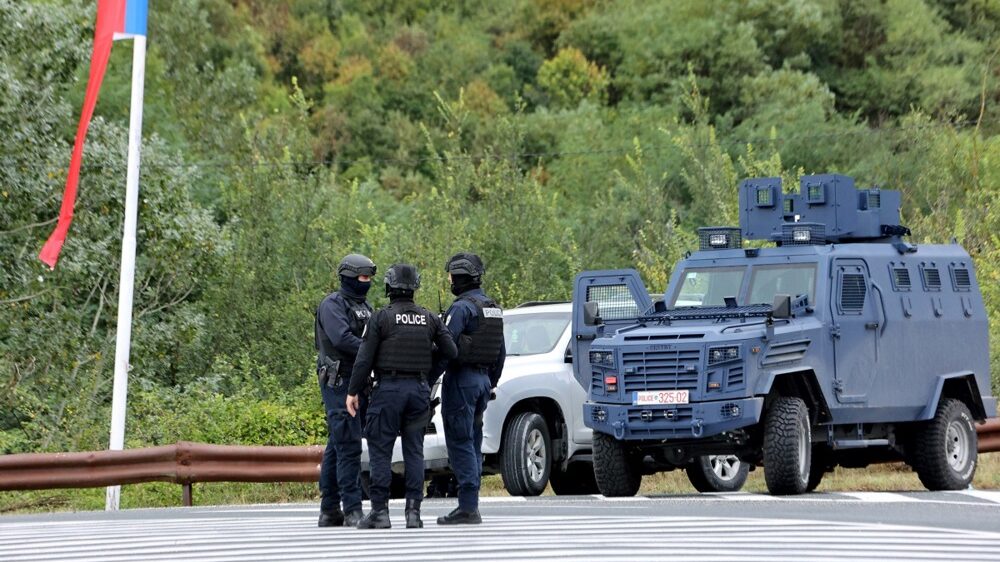False narratives, which target the security sector in Kosovo and are often influenced by Russian and Serbian propaganda, distort the interpretation of security incidents and portrayal of security institutions, leading to potential destabilisation, BIRN and Internews Kosova fact checking platform concludes.
Kosovo has experienced a surge in disinformation since the Banjska attack in late September 2023. The incident, which occurred in and around the Banjska monastery in the north of Kosovo, saw armed Serbs attack a Kosovo police patrol, resulting in the death of one Kosovo police sergeant.
The bloodshed resulted in increased tensions with Serbia, as Kosovo authorities accused Belgrade of direct involvement in the operation. Three Serb gunmen also died during the police operation in Banjska/Banjske.
The Banjska attack underscored the urgent need in Kosovo for reliable reporting and vigilance against malicious narratives aiming to manipulate public perception and exacerbate tensions.
The fact checking platform Krypometër (English: Measuring Saltiness), published by BIRN and Internews Kosova, identified 38 fake news in less than 6 months, with most false stories related to interethnic crises and Kosovo’s security authorities, the Police and the Kosovo Security Forces, as well as NATO Peacekeeping Mission in Kosovo, KFOR. These articles originated from various websites, online media outlets, and social media accounts in Kosovo.
The name Krypometër is a reference to the Albanian expression “Na krypi tu na rrejt (They salted us by lying)” used to describe a person who lies, making a metaphorical comparison between the inability to enjoy food with high amount of salt and the ability of humans to handle statements, stories, or narratives being served to them.
Visar Prebreza, managing editor of Krypometër, told Kallxo Përnime TV Program, on March 24, 2024 (exactly six months from the attack), that “disinformation regarding the events in Banjska started on the same day as the terrorist attack”.
According to Prebeza, ”it is clear that fake news has political purposes, some of which were published for the [Serb majority] northern part of the country with the aim of destabilisation, implying to the Serbian citizens there that the Kosovo Police and Government do not aim to protect them, this also happened in the case of Banjska.”
Disinformation, a foreign propaganda tool for destabilising Kosovo

Armed Kosovo police officers control the road near the village of Banjska, Kosovo, 25 September 2023. Photo: EPA-EFE/DJORDJE SAVIC
Security and media experts believe that foreign propaganda, mainly from Russia and Serbia, uses disinformation as a soft power tactic to destabilise Kosovo.
The spokesperson of the Kosovo Police for the Mitrovica region, Veton Elshani, highlighted that he has heard more fake news in the four Serb majority municipalities in the north of Kosovo since April 2023 than in the entirety of his “24 years of experience in law enforcement.”
North Mitrovica based journalist Branislav Krstic believes that fake news in this part of the country mostly impacts people who express nationalist sentiments, and not citizens in general.
“Serbs in the north have refused to be part of the resistance in Banjska against the Kosovo state police and against state institutions. We had Banjska about 5 kilometres away, and there were people fighting, but in North Mitrovica, we had 3 weddings,” Krstic emphasised.
Muhamet Hajrullahu from the “Telegrafi” media outlet declared that, in order to avoid fake news, the media must use official sources, and citizens should read from trusted media.
“In the rush for information explosion, there have been media in Kosovo that have not officially confirmed reports, and then either removed or changed the headlines of their reports or something similar”, noted Hajrullahu.
“Media needs to be careful, especially in reporting on sensitive topics such as the northern part of the country”, Hajrullahu added.
Kosovo based security expert Nuredin Ibishi, said that “the Russian influence is stronger in the Balkans.
BIRN and Internews Kosova have consistently reported on the presence of Russian and Serbian propaganda in Kosovo, especially in the Serb majority north. This propaganda aims to incite tensions.
Enver Dugolli, MP from Kosovo’s ruling Vetevendosje Movement party, highlighted that “specific criminal groups exploit every opportunity to spread fake news with the aim of causing the desired effect,” explaining that fake news often spreads in Kosovo through Serbia but following the Russian agenda. The aim “is to destabilise the country”, he believes.
Non-state actors’ fake news, also dangerous
Besides Russian and Serbian fake news, experts claim that increasing amounts of misinformation in Kosovo originates from non-state actors.
Ramadan Ilazi, head of research at the Kosovo Center for Security Studies, KCSS, stressed that “sometimes there is fake news produced by non-state actors operating within the strategically allied states of Kosovo, so not every time the source is from actors we call malicious, such as Russia and China,” Ilazi declared.
Professor at the Department of Journalism at the University of Prishtina Muhamet Jahiri thinks similarly, stating that, while Kosovo is not alone in facing this challenge, the damage from misinformation is greater in Kosovo compared to Western countries that are better regulated.
“There are two categories of fake news, first, those related to profit from views, and secondly, those related to Russian propaganda. Kosovo, like the whole world, is facing fake news, but of course, Western countries have much higher capacities in terms of knowledge and education to make this difference, for Kosovo, as a country in transition where everything is really out of control both in terms of regulation and social awareness, this poses a challenge,” stated Jahiri.





